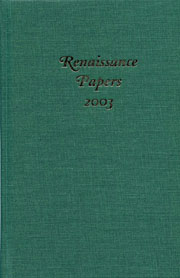Book contents
- Frontmatter
- Contents
- Renaissance Papers
- Homer, Erasmus, and the Problem of Strife
- William Tyndale Among the Demons
- The Printing of “this written book”: G.T. and H.W.'s Editorial Disputes in The Adventures of Master F.J.
- George Puttenham as Comedic Artificer
- Amoret and Scudamour Woo and Wed: Two Courtly Histories and a Stalemate
- Strange Bedfellows: “The Churching of Women” and The Taming of the Shrew
- “Romans, countrymen, and lovers”: Performing Politics, Sovereign Amity and Masculinity in Julius Caesar
- “Rouse Up a Brave Mind”: The Merchant of Venice and Social Uprising in the 1590s
- Revenge Tragedy and Elizabeth Cary's Mariam
- “very worthely sett in printe”: Writing the Virginia Company of London
Revenge Tragedy and Elizabeth Cary's Mariam
Published online by Cambridge University Press: 12 September 2012
- Frontmatter
- Contents
- Renaissance Papers
- Homer, Erasmus, and the Problem of Strife
- William Tyndale Among the Demons
- The Printing of “this written book”: G.T. and H.W.'s Editorial Disputes in The Adventures of Master F.J.
- George Puttenham as Comedic Artificer
- Amoret and Scudamour Woo and Wed: Two Courtly Histories and a Stalemate
- Strange Bedfellows: “The Churching of Women” and The Taming of the Shrew
- “Romans, countrymen, and lovers”: Performing Politics, Sovereign Amity and Masculinity in Julius Caesar
- “Rouse Up a Brave Mind”: The Merchant of Venice and Social Uprising in the 1590s
- Revenge Tragedy and Elizabeth Cary's Mariam
- “very worthely sett in printe”: Writing the Virginia Company of London
Summary
Revenge tragedy flourishes in periods of social, political, and religious change, when the new law challenges the old, and problems emerge to which there are no clear religious or legal solutions. Revenges multiply, and sometimes audiences become sympathetic to revengers trapped in situations which seem to offer no other recourse. The protagonists of Thomas Kyd's Spanish Tragedy (1587-89) and Shakespeare's Hamlet (1602) elicit such sympathy. The theatre becomes an arena in which audiences examine ethical problems and perhaps move slowly toward new attitudes. But as change becomes more threatening to society, in the later revenge tragedies the revenger threatens established order and is depicted as a villain. In the struggle between old and new the old almost always wins.
Twentieth-century critics have weighed in with theories of revenge tragedy and its ambiguities. A. C. Bradley, speaking generally, says that the tragedy shows “two sides or aspects which we can neither separate or reconcile.” And Robert Ornstein follows his discussion of the authors of revenge tragedy with the conclusion that “Embodied in their plays is an awareness that familiar ways of life are vanishing and that traditional political and social ideals are losing their relevance to the contemporary scene.” Mary Beth Rose argues that tragedy in general occurs at times of change and “By clearly defining and finally immobilizing the destructive ambiguities of suffering and injustice … tragedy provides an affirmation that a future is possible.”
- Type
- Chapter
- Information
- Renaissance Papers 2003 , pp. 149 - 166Publisher: Boydell & BrewerPrint publication year: 2004

